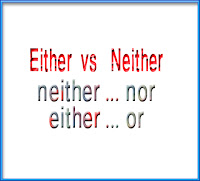
A- neither,
either
neither means 'not one and not the other'. It takes an affirmative singular verb. either means 'any one of two'. It takes a singular verb

1- neither means
'not one and not the other'. It takes an affirmative singular
verb. It can be used by itself or followed by a noun or by of + the / these / those / possessives
or personal pronouns:
(a) I
fried both keys but neither (of them) worked.
(b)
Neither of them knew the way/Neither boy knew . . .
(c) I've
read neither of these (books).
------------------------------------------------------
2- either means
'any one of two'. It takes a singular verb and, like neither,
can be used by itself or followed by a noun/pronoun or by of + the/these/those
etc.
------------------------------------------------------
3 - either +
negative verb can replace neither+affirmative except
when neither is the subject of a verb. So either could not be used in (a) or
(b) above but could in (c):
I haven't
read either of these (books).
Though either cannot be the
subject of a negative verb, it can be subject or object of an affirmative or
interrogative verb:
Either
(of these) would do.
Would you
like either of these?
------------------------------------------------------
4-
Pronouns and possessive adjectives with either/either used of people should
technically be he/him, she/her and his/her, but in colloquial English the
plural forms are generally used:
Neither
of them knows the way, do they? Neither of them had brought their passports.
------------------------------------------------------
B)
neither . . . nor, either ... or
neither . . . nor + affirmative verb is an emphatic way of combining two negatives:
(a)
Neither threats nor arguments had any affect on him.
(b) They
said the room was large and bright but it was neither large nor bright.
(c) He
neither wrote nor phoned.

either
... or + negative verb can replace neither . . . nor except when neither . .
nor is the subject of a verb, as in (a) above. So:
(b) . . .
but it wasn 't either large or bright and
(c) He
didn 't either write or phone.
either
... or cannot be the subject of a negative verb but can be the subject or
object of affirmative or interrogative verbs and is used in this way to express
alternatives emphatically:
You can
have either soup or fruit juice, (not both)
You fnusi
either go at once or wait fill tomorrow.
It's
urgent, so could, you either phone or telex?

ليست هناك تعليقات: